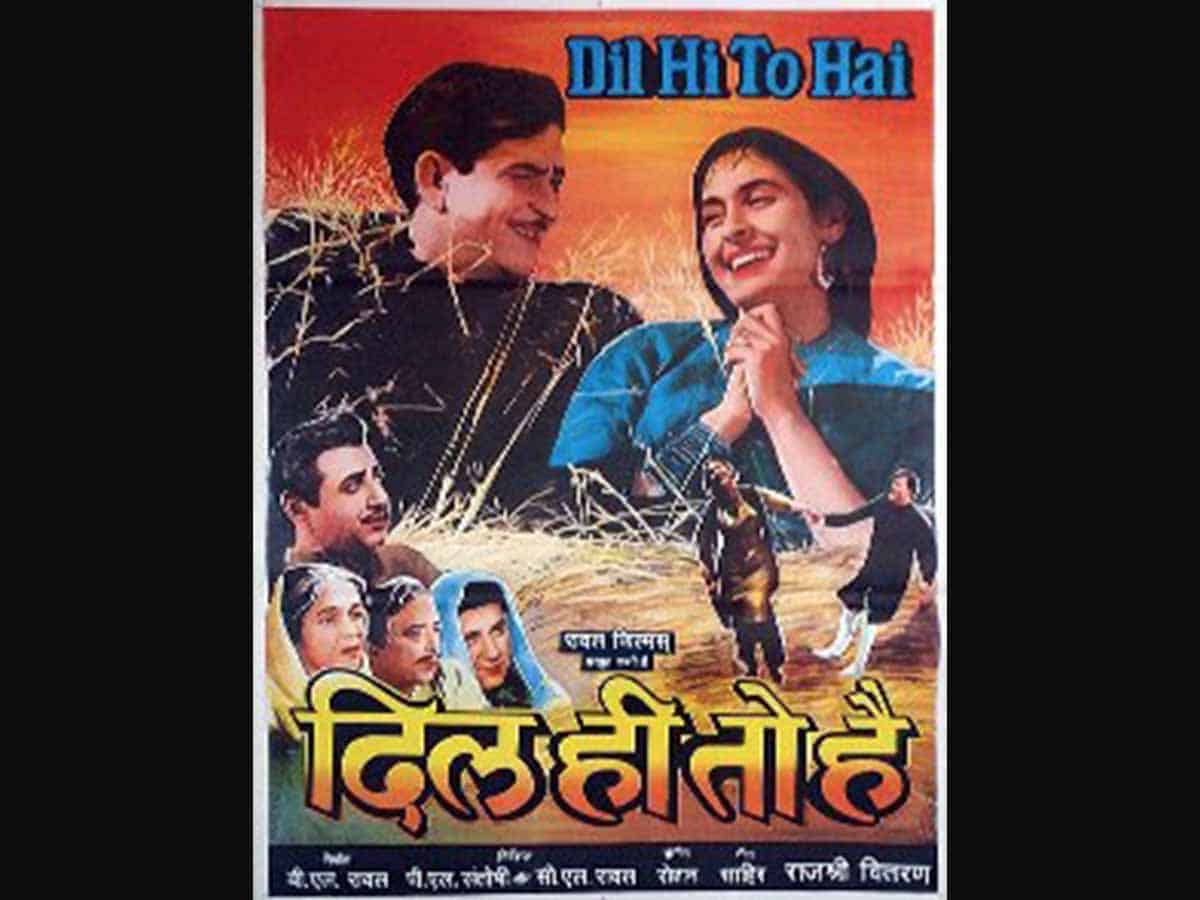‘Dil Hi To Hai’ is easily one amongst the great romantic films of Hindi cinema’s Golden Era. Though it falls broadly into the category of Muslim Socials that held sway in the 1960s, it is also a musical-romantic film of Indian Cinema.
Made in 1963, all of the songs in the film proved to be a runaway hit. The team-up of lyricists Sahir Ludhianvi-Roshan proved to be popular yet again, like in Barsaat ki Raat, Taj Mahal and Bahu Begum.
Starring Raj Kapoor and Nutan, the movie’s title comes from the opening phrase of Mirza Ghalib’s poem ‘Dil Hi To Hai, na sangh-o-khisht/ Dard se bhar na aaye kyun/ Royenge hum hazaar baar, koyee hume sataaye kyun’.
‘Dil Hi To Hai’ is a theme that is beautifully etched in two songs. These are, ‘Dil jo bhi kahega manenge’ and the second one, ‘Bhoole se mohobat kar baitha, naadaan tha bechara dil hi to hai’.
It has several novelties. Like in the title-song, Raj Kapoor, playing Yusuf, sports the Rumi Topi, or the Turkish Fez Cap, which was once very popular in Hyderabad.
Yet another novelty is Sahir’s portrayal of his avowedly left-of-centre and progressive ideology in the title-song. Here’s a verse from it: ‘Haar mani nahi zindgi se, hanste-milte rahe har kisi se, kyun na is dil pe qurban jayen, sah liye jisne gham bhi khushi se, sukh mein jo na khela hum hi to hain, dukh se jo na hara dil hi to hai, duniya mein humara dil hi to hai’.
A unique expression of love is a challenge for any film lyricist. Several poets in the past tried out several ways to do so, with varying degrees of success. Sahir comes up with his own unique novel formulation and style.
It is daring: ‘Tum agar mujh ko na chaho to koyee baat nahi, tum kisi aur ko chahogi, to mushkil hogi…. Agar ab mel nahi, to judaai bhi nahi, baat todi nahi, to tumney banaai bhi nahi, Yeh sahaara hi bohot hai mere jeene ke liye, Tum agar meri nahi, to paraai bhi nahi’. Such an expression hardly can have any parallel.
A second variation of the same theme is the sadder, more poignant version titled ‘Bhoole se mohobat kar bhaitha’. As he sings in the song, the lines ‘Is tarha nigahen mat phero, aisa na ho dhadhkan ruk jaye, seene mein koyee pathar to nahi, ehsaas ka mara dil hi to hai’, Nutan in the movie breaks down, sobbing inconsolably. Nutan comes across as a very romantic actress, who shines in the film.
Qawwali, a Sufi-Islamic form of devotional singing, is primarily male-dominated. Hindi Cinema did try out Qawali contests between a group of men and a group of women in Barsaat ki Raat and between two groups of women in Mughal-e-Azam. But Nutan excels in ‘Dil Hi To Hai’, stealing the show in the Qawwali number ‘Raaz ki baat hai, mehfil mein kahe ya na kahe’.
Two of the most memorable songs in ‘Dil Hi To Hai’ are by Manna Dey. One is a classical song, packed with philosophical strain, which is, ‘Laga chunri mein daagh chhupaon kaise… odhi chunariya Atma mori…..’ and the other Manna Dey song is a duet with Asha Bhosle called ‘Parda utthe salaam ho jaaye, baat ban jaaye kaam ho jaaye’.
Roshan in the movie experimented in the musical score by using the modern orchestra in this song in the traditional Qawwali format. However, the film opens on a slow pace, as the plot has to unfold. It takes time to establish the plot and once that is done, it picks up pace.
It is pretty much like the movie ‘Professor’, made a year earlier in 1962. Starring Shammi Kapoor and Kalpana, the plot is carefully laid out to pave the way for the breezy romance that follows, between the lead pair.
Another striking similarity between ‘Professor’ and ‘Dil Hi To Hai’ is the hero playing the old man with his own lady love. Equally admirably like his younger brother Shammi Kapoor, Raj Kapoor, too, acquits himself with distinction.
It is quite a winding plot. Nawab Jalaluddin (Hari Shivdasani) and his Begum (Mumtaz Begum) lose three sons at birth. So, the fourth son, Yusuf (Raj Kapoor) is sent away soon after his birth, to be brought up by another couple, the brother and wife of the Begum, for three years.
Nawab Jalaluddin’s friend is Khan Bahadur (Nasir Hussain), whose daughter is Jameela Bano (Nutan). It is under the aegis of Khan Bahadur that Yusuf is looked after by Sheikhu’s parents, paying Rs 300 to the couple. But the amount is siphoned off for the upkeep of their own son, Sheikhu (Pran).
Khan Bahadur also arranges a maid to look after Yusuf. The maid (Leela Chitnis) and the couple, who bring up Yusuf, meet at the railway station, on way to Nawab Jalaluddin’s home. As the arrival of the train is delayed by four hours, Yusuf and the maid fall asleep. When the train arrives, the couple, with their son Sheikhu, dump Yusuf and catch the train and reach Nawab Jalaluddin home, passing off Sheikhu as Yusuf.
Khan Bahadur decides to marry off his daughter Jameela Bano with Yusuf. In turn, Sheikhu’s parents plan to corner the entire wealth of the both the families.
Yusuf goes on to be a renowned singer Chand and Jameela Bano falls for him. The twists and the turns in the tale carry forward the romance of Yusuf and Jameela Bano.
Venkat Parsa is a senior journalist and writer based in New Delhi

